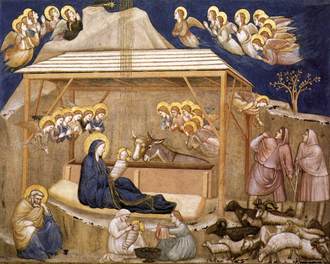 Often we hear the reminder, “Jesus is the reason for the season.” Indeed, but let’s be clear that there are two things emphasized here. One is the focus on Jesus; the other is that Christmas is not a day, but rather it is a season. Going against the lure of secular culture which encourages us to throw our Christmas trees to the curb the day after the feast of the Nativity, we need to remember to savor this entire season just as we savored Advent. The Christmas season is so brief that it is important to take the time for reflection, and with gratitude, simply drink it all in. We have been invited to sit with the shepherds, the kings, and the Holy Parents as they are rapt with adoration and love for the Child Jesus. We need do nothing but be present to experience the love which emanates outward from Jesus to all who are gathered around His crib. It is a time of joy, glorifying God, becoming awestruck with wonder, and being filled with gratitude for the magnanimity of God. It is a time which celebrates God’s great mercy and generosity, and we are called to live the season in that same spirit. However, in our secular culture the pull is away from this: the emphasis seems to be on greed and getting rather than upon the message behind the coming of the long awaited Messiah as a tiny baby. Indeed, Jesus calls us to generosity, not greed. 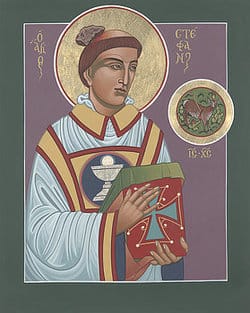 Christmas is a brief season, but it is replete with important feasts representative of the life into which this tiny Baby entered. It includes various remembrances from the Holy Innocents to the Holy Family, the martyrdom of St. Stephen to the gospel writer, St. John. And throughout the season we sing carols which are only heard during this time of year, gladly acknowledging the greatness of the gift we have received through the newborn Jesus and His family. However, there is one song that I have not heard in a while, a carol sung much more frequently in the past then it is now. The ‘neglected’ carol is Good King Wenceslas, of which many of us only know the first line: “Good King Wenceslas looked out on the feast of Stephen.” It is a rather catchy tune, but the lyrics never mention Jesus or His birth, so perhaps that is why we rarely hear it. However, what we may not realize is that the song is about the essence of Christmas: it is about mercy and generosity. Rather than being about Jesus, it is about being like Him; its lyrics are about the message of Jesus rather than about the circumstances of His birth.* The song challenges us to take something away from the manger scene, but only so that we might give it to others. That is, we are supposed to bring the joy and wonder of the Child out into the world. We are to live what the Christmas season is about: generosity, and not greed. We share His love, we do not hoard it. 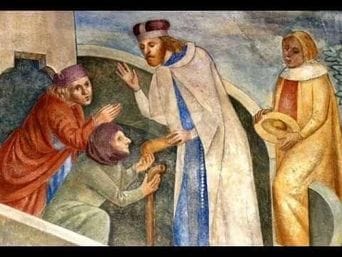 The song fits into the Christmas season because it connects the martyr St. Wenceslas, with the first martyr, St. Stephen, whose feast is the day after Christmas. Wenceslas, also known as Vaclav, was not a king, but a duke. He was born in Bohemia (now Czechoslovakia) in 907, and raised by his grandmother, St. Ludmilla. In brief, Ludmilla supported the Christians of the region, influencing Wenceslas to grow up with the same values. Eventually Ludmilla was murdered, but Wenceslas gained leadership. He devoted his time to uniting Bohemia and also to supporting the Church. He was known as a peace-maker, a man of generous heart and kind deeds. Unfortunately, in 935 his brother Boleslav set up an ambush by inviting Wenceslas to attend a Mass on the feast of Sts. Cosmas and Damian, murdering him while he was on the way. Wenceslas is said to have forgiven his brother as he lay dying. He was soon declared a martyr because he died while trying to make peace and uphold Christian values in the land. Although we do not know much about St. Wenceslas, the good ‘king’ of song, we do know that he was generous with the poor. The carol is based upon this virtue which he lived heroically, and the opening line about his ‘looking out on the feast of Stephen’ is symbolic of the martyrdom for the sake of Christ which he eventually underwent. The generosity for which he was famous was well documented. In the year 1119 a historian named Cosmas of Prague wrote the following about the ‘good king’: “But his deeds I think you know better than I could tell you; for, as is read in his Passion, no one doubts that, rising every night from his noble bed, with bare feet and only one chamberlain, he went around to God’s churches and gave alms generously to widows, orphans, those in prison and afflicted by every difficulty, so much so that he was considered, not a prince, but the father of all the wretched.” **  The life of St. Wenceslas reminds us that embracing the coming of Jesus is not something we do for a day, but rather it takes a lifetime to learn the mercy and generosity of Christ. It takes courage to live a Christian life in the midst of a secular culture. Just as we tried to resist the urge to disregard the season of Advent, trying to move against getting caught up in the frenzy of doing seemingly good things at the expense of our spirituality, so too do we need to resist the pull to forget that Christmas is a season and not just one day. Buying gifts to give at Christmas is indeed a good thing, but if we got so caught up in the sense of obligation that we forgot the true reason, we have accomplished nothing other than accumulating a whole lot of stress. Similarly, if we forget that Christmas extends beyond December 25th, we can continue to get caught up in the materialism and consumerism of running around looking for more bargains, returning unwanted gifts to find something better, thereby misplacing the point of the coming of Jesus in the first place. Jesus came so that we might learn generosity, not greed. 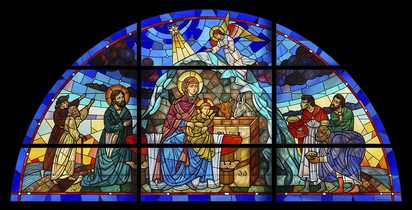 If we look to our crèche scenes once again, our focus goes to the people gathered. We see the shepherds who came to bring praise, heads reverently bowed at the wonder of it all. We observe the magi, who came with their magnificent prophetic gifts for the newborn King. We see the animals that provided warmth for the family, and even the manger which they ‘sacrificed’ in order for Jesus to have somewhere to lay. Finally, we notice Joseph and Mary who gave everything they had for this Child, offering the whole of their lives to provide nurturing, care, and security. All those in the scene are there in the spirit of giving. But most of all, present in the stable is the amazing generosity of God who gave us His Son that we might have life. Absolutely everything about the Nativity scene is about giving. The question to ask, then, is: what do we bring? Clearly, all we can bring is the gift of ourselves. We offer our lives to follow the Child who we heard Isaiah declare would lead us all. (Isaiah 11:6) We offer the humble gift of our suffering, woundedness, and the good intentions which fell flat; we offer our imperfect love and our imperfect lives, but also our giftedness and good works. To the One who has offered all that He is, we offer all that we are. It is really the only gift that He desires, and it is the gift which gives Him the greatest joy: it is our generous gift of self which Jesus treasures the most. 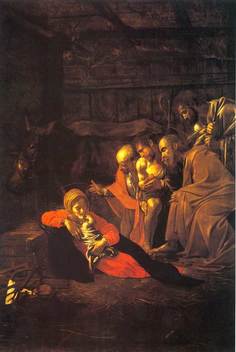 As we continue to celebrate this Christmas season, the joyful giving exemplified by Good King Wenceslas can touch our hearts in a deeper way. We can take the time to reflect upon those gathered at the crèche scene, and why they are there, so we do not miss the generous love with which Jesus came into this world. We can discover the joy of giving without seeking return as we realize the magnitude of the gift given us by Jesus. If we seek to be like St. Wenceslas, we can take the wealth of who we are and what we have to offer, (not always something material), and we can learn that as the song says, “Ye who now will bless the poor, shall yourselves find blessing.” May we reflect upon the great gift of all those who are gathered at the manger with us! May we ask Jesus to help turn any area within our hearts which is greedy, or any motivation we have toward selfishness, into generosity and mercy! May we give our time, talent, and treasure to those who are in need, and be generous in our thoughts and deeds when we are challenged by the spirit of impatience, judgmentalism, anger, gossip, divisiveness, envy, revenge, unforgiveness, selfishness, or apathy! May we follow the example of St. Wenceslas, giving to those who are poor in any way! May we pray for our world and its leaders, that they may become more generous, kind, and merciful in how they make decisions! And may we be humble like the tiny Child, offering all we have to Him, as He does for us! Peace! ©Michele L. Catanese Next entry: January 16. * The entirety of the lyrics of the carol Good King Wenceslas can be found at the following link: https://www.carols.org.uk/good_king_wenceslas.htm. You will note that the title of this entry is the first line of the final verse, and from the final verse is also the last line prior to the closing ‘prayer’ paragraph. ** The quote from Cosmas of Prague can be found in the following article about St. Wenceslas. http://www.catholic.org/saints/saint.php?saint_id=592 Other sources used for this entry: https://en.wikipedia.org/wiki/Good_King_Wenceslas https://en.wikipedia.org/wiki/Wenceslaus_I,_Duke_of_Bohemia https://www.franciscanmedia.org/saint-wenceslaus/ Images: The first image is of the Nativity, painted by Giotto in 1309. It is found in the lower church in the Basilica of St. Francis in Assisi, Italy. While the kings seem to be absent from this scene, I chose it because it seems rather 'true to life.' The shepherds are a bit awestruck and overwhelmed; the cows and sheep seem to be much more attentive, joining Joseph who sits on the ground contemplating the scene (although one sheep is distracted and foraging, sort of like us when we forget the season!) Second is an icon by Fr. William Hart McNichols called Holy Protomartyr Saint Stephen. I chose this icon because of the reference in the song (Good King Wenceslas) to the Feast of Stephen. His feast is the tie of the carol to the season. If you are interested in purchasing a copy in one of a number of mediums, it can be found at http://fineartamerica.com/featured/holy-protomartyr-deacon-st-stephen-261-william-hart-mcnichols.html Third is a painting of St. Wenceslas taken from a YouTube video of the carol, complete with lyrics. I chose this painting because it so beautifully depicts Wenceslas as in the song: he is giving bread to the poor. To watch the video click here: https://www.youtube.com/watch?v=2-ZrmdMEasQ Fourth is a photo I took in Grapevine, TX. I chose this because it represents the joy of the Christmas season. As I said, there is much good in celebrating the season so long as we keep it all in perspective. We should decorate and we should have fun. But we also need to share the reason for the season. Fifth is a stained glass window which depicts all of the 'characters' from the combined Nativity narratives of Matthew and Luke. Everyone, including the animals, is shown in this remarkable stained glass. I chose it because I loved that the magi, often referred to as kings, were dressed humbly without crowns. It took me a few moments to realize that they were indeed the magi. If not for the gifts in their hands, I would not have known who they were! This highlights that, despite the lyrics of the carol which calls the men kings, (We Three Kings) the only true king in the Nativity scene is Jesus, the Lord. The shepherds are also in the proper stance, pointing to God, on high, personified by the Star. This whole humble scene is a glorification of God. I found this scene with help from Google at http://www.desktopimages.org/preview/169763/2100/1070/o Last is an exquisite painting by Caravaggio, Adoration of the Shepherds. I chose it because the shepherds are reflecting upon the scene at the manger to which the angels drew them. Poor as they are, they are aware that they have a precious gift to offer along with their adoration of the Holy Child. In truth, they are giving the gift of their lives just as He gives His to them. I offer my prayer for all my readers to have a blessed and happy New Year!
Dwight
1/2/2017 06:28:19 pm
Very nice...thanks Comments are closed.
|
Heart Speaks to Heart
|

 RSS Feed
RSS Feed

